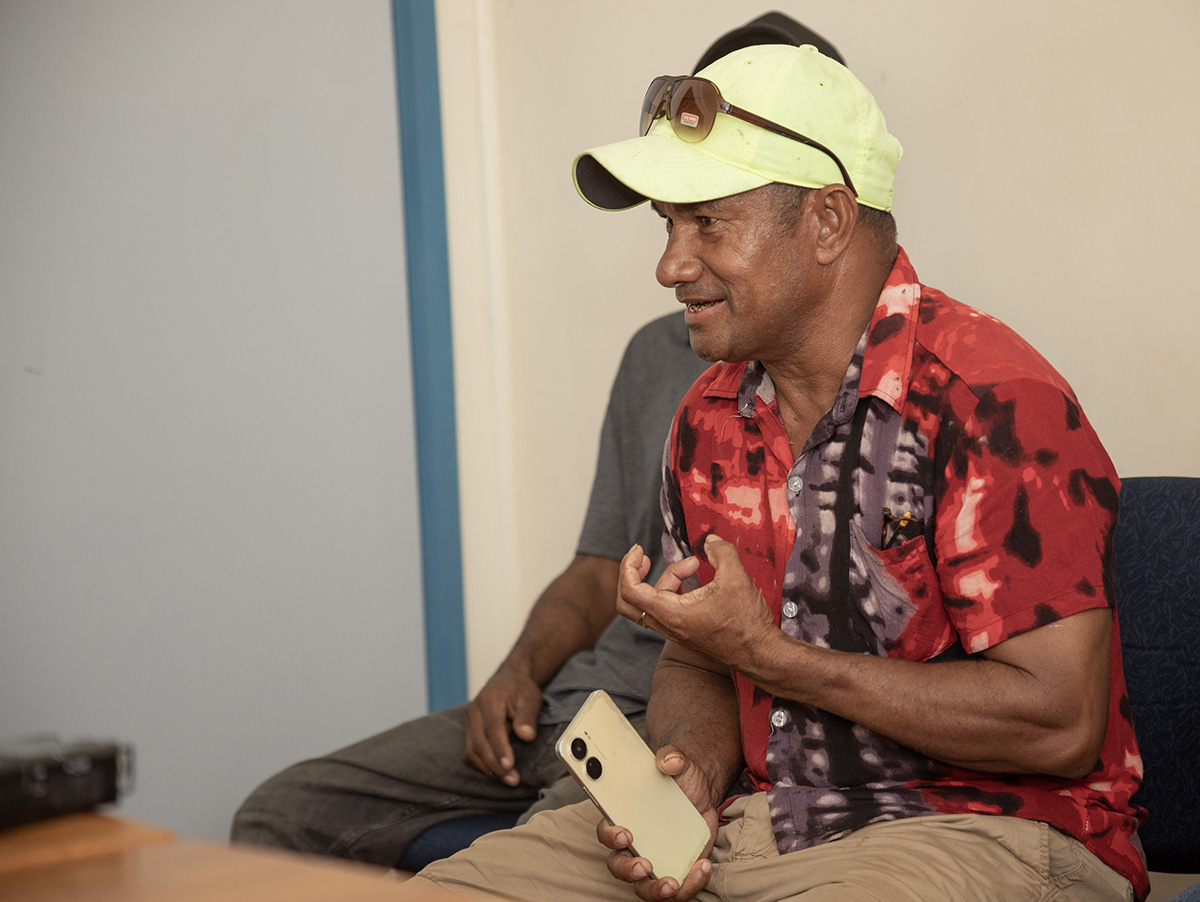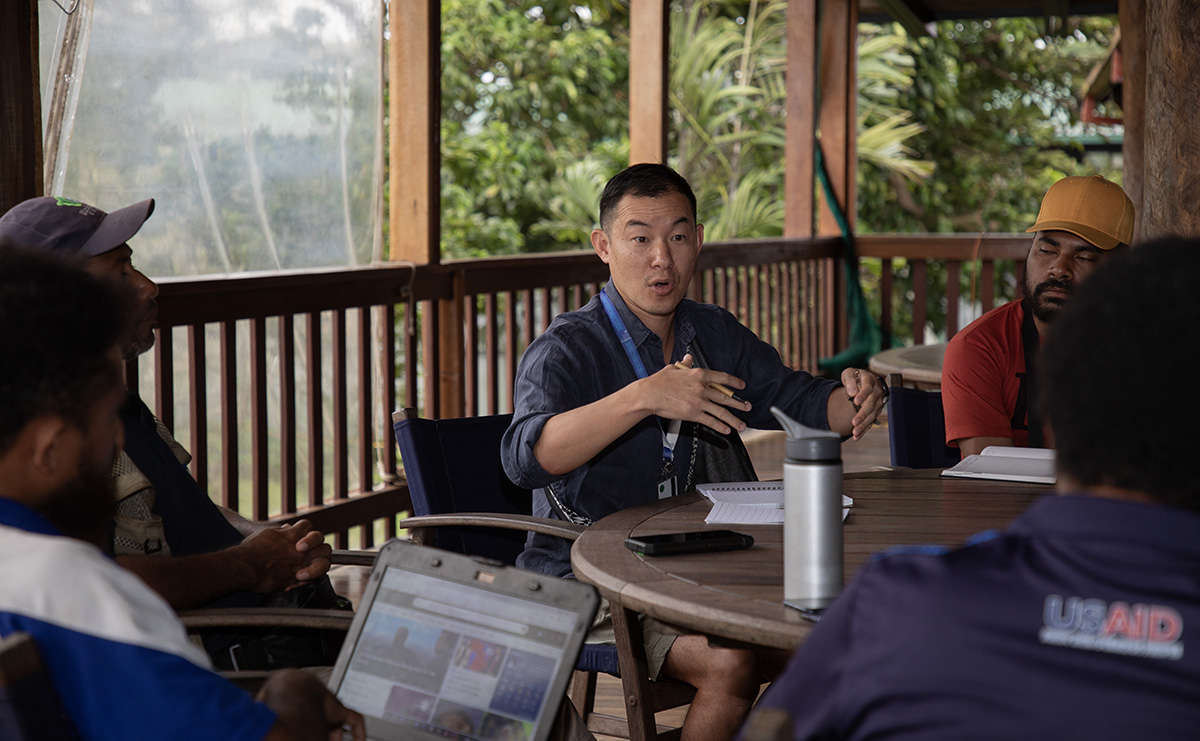Introducing the 'Gutpela Solwara Gutpela Bisnis' Project that aims to promote the development of a blue economy amongst coastal communities while emphasising the importance of marine conservation.

Milne Bay Province is predominantly a maritime province. Seaweed farming is one of many community-led initiatives aimed to improving their livelihood.
A five-minute boat ride across from Bubuleta, a community along the East Cape Road of Milne Bay Province lies the tiny island of Mahabalina.
On the western end of the island, overlooking the deep blue sea, a seaweed farmer and exporter Mr. Ben Williams proudly showcases a row of floating devices located about a hundred meters away from the coast, gently bobbing in the sea.
"This is our seaweed nursery," Mr. Williams explains to a group of visitors, gesturing towards the floating devices. "From this nursery, we supply seaweed to farmers throughout the province. Seaweed acts as a ‘natural Fish Aggregated Devices [FADs]’ system that attracts fish and as a result, seaweed farming is a business that contributes to marine conservation and improves the livelihoods of local fishermen."
The visitors, including national government officers from the Conservation Environment Protection Authority (CEPA), United Nations Capital Development Fund (UNCDF), and United Nations Development Programme (UNDP), were on a scoping mission to gain a deeper understanding of the province's marine economy.

Mr Williams (right) passionately explaining the operations of the seaweed nursery to the intrigued visitors.
Introducing the Gutpela Solwara Gutpela Bisnis Project to the province
The team was there to introduce a joint program called ‘Gutpela Solwara Gutpela Bisnis’ which aims to promote the development of a blue economy amongst coastal communities while emphasizing the importance of marine conservation.
“We successfully launched the project in West New Britain Province where we developed a Blue Economy Incubation Facility earlier this year. The facility provides financial and technical support to local women-led blue MSMEs in order to both conserve the local marine biodiversity and to provide sustainable livelihoods to local communities. We aim to run a similar programme here in Milne Bay,” explains Ms. Elsie Simeon, the manager of the project from UNDP.

Ms. Elsie Simeon, Project Manager to the Gutpela Solwara Gutpela Bisnis Project
Milne Bay Province covers 14,345 km2 of land and 252,990 km2 of sea including more than 600 islands. It contains the largest coral reef area of any province in Papua New Guinea, a third of the whole country. This region boasts a remarkable diversity of coral reef fish, with a total of 1,200+ species recorded, the second highest number found in any area, after that of Rajah Ampat.

Seaweed farmer Mr. William Benjamin harvesting seaweed
This remarkable marine diversity provides Milne Bay with ideal conditions for developing reef-positive businesses. These opportunities include seaweed farming, sustainable fishing, and eco-tourism services such as guest houses, birdwatching, snorkelling, and manta ray stations. The province benefits from strong cooperation between the provincial government and community-led initiatives, making it an ideal environment for sustainable economic growth.
"We aimed to enhance UNDP’s and CEPA’s collaboration with these organizations to successfully implement the project in the province. Through meetings with potential MSMEs, we aim to evaluate the blue economy landscape and our findings reveal a strong level of cooperation between provincial administrative entities and the MSME sector," says Ms. Simeon.
The team also held meetings with local conservation organizations to explore potential partnerships and identify opportunities within the blue economy.
The threats to the coral reef systems
Director of Eco-Custodian Advocates, Mr. David Mitchell points out that coral bleaching is having a significant impact on coral reefs and other marine life throughout the country.
The NGO focuses on promoting marine management by reinforcing traditional conservation knowledge. Its key role is to empower and strengthen the advocacy of local communities in achieving sustainable environmental goals.

Eco-Custodian Director, Mr David Mitchell
"Coral bleaching is a significant issue with widespread consequences. In 2023, Milne Bay experienced a devastating coral bleaching event due to nine months of high-degree heating for weeks exceeding the threshold of 8 DHW, resulting in the death of corals," explains Mr. Mitchell.
Runoff from oil palm plantations, logging, and other forms of development activities, along with overfishing, also pose threats to coral reefs.
Mr. Mitchell's organization promotes the traditional conservation system known as ‘Gwala’, believing that communities will benefit from this approach.
"Examples of successful blue businesses include Sibonai Guesthouse in Sewa Bay, Normanby Island, the endemic birds of Sudest and Rossel Islands, Gonubalabala manta ray cleaning station, and the Gwala site of Anagusa. There is also potential for pearl farming around Basilaki and June islands," Mr. Mitchell added.
Finding profitable markets remains a challenge for local blue businesses
Seaweed farmer William Benjamin acknowledges that low export prices remain disheartening for local seaweed farmers. He owns a commercial seaweed farm and faces challenges in selling his produce.

Harvested seaweed from Mr. Benjamin's farm being sorted out at the Provincial Fisheries warehouse
"Seaweed cultivation is a promising venture. However, the market is highly competitive. While there may be a strong demand initially, oversupply can quickly lead to a sharp decline in prices," explains Mr. Ben Williams.

Products made from seaweed from a local SME based in Alotau, Milne Bay Province.
Fisherman Mr. Eric Etheni of Isutete Cooperative Society also highlights the issue of cold storage for fishermen from the outer islands.
He emphasized the importance of preserving the fish from the moment they are caught all the way to the market. Mr. Etheni expresses concerns about the current lack of proper storage facilities, which can lead to spoilage and decline in quality. This issue not only affects the fishermen's livelihoods, but also impacts the overall supply chain and availability of fresh fish in the market.

Fisherman, Mr. Eric Etheni, highlighting some of the issues they face transporting and selling their fish.
Working in partnership to realise an ambition
Milne Bay Provincial Administrator, Mr. Igo Gari, gave his support and enthusiasm for the project’s arrival.
“My ambitious view is to protect 40-50% of Milne Bay’s waters and at the same time create economic opportunities for the local communities. To do that, we must convince the communities to protect their environment while simultaneously ensuring that there is a pathway for them to earn money,” Mr. Gari stated.
Mr. Bernard Suruman, the Marine Protected Areas Manager at CEPA, emphasized that the primary focus is on conserving and protecting the region's exceptional marine biodiversity.
“This project is an incentive to promote and assist local communities with marine conservation. It should allow local communities to protect their area and at the same time generate income,” said Mr. Suruman.
The primary objective of the UN Capital Development Fund (UNCDF) was to conduct an initial scoping assessment to evaluate the demand for financing among MSMEs and assess the willingness of financial service providers (FSPs) to offer such services. This entailed determining the interest and preparedness of both MSMEs and FSPs to participate in financial opportunities.
The crucial technical aspect of the mission was to initiate the evaluation of potential investment initiatives and opportunities that could enhance the project.
"There is huge potential for Milne Bay and its communities to benefit from our project and grow the Blue Economy space in PNG. Access to finance for MSMEs can significantly bolster this development by enabling business growth, promoting sustainable practices, creating jobs, fostering innovation and diversification, improving infrastructure, enhancing community resilience, and investing in skills training. By empowering MSMEs through better financial access, Milne Bay can ensure a sustainable blue economy that benefits both the environment and local communities," stated UNCDF Consultant, Mr. Christopher Wong.

UNCDF Consultant, Mr. Christopher Wong, explaining UNCDF's role in the project.
The 'Gutpela Solwara Gutpela Bisnis' Project, which is generously funded by the Global Fund for Coral Reefs and the Joint SDG fund, aims to shape the sustainable development of Papua New Guinea’s blue economy. By integrating the concept of the blue economy into ocean management, the project seeks to address the challenge of generating revenue from protected areas while simultaneously bolstering the marine conservation efforts by local communities.

 Locations
Locations










